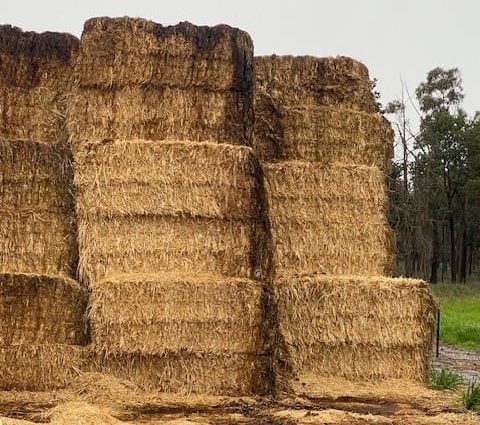
Weather-spoiled hay. Image – Feed Central
ABOUT a third of the hay produced in southern Australia this season won’t be able to be sold through Feed Central’s consignment system after being left uncovered and damaged by rain.
While it can still be traded from farms and the damage comes as demand for hay has fallen, Feed Central fears ongoing failure to properly store hay could have long-term impacts on the feed industry.
Feed Central managing director Tim Ford said the damage proved that uncovered stacks don’t always work.
“This year the outside stack strategy has come unstruck,” Mr Ford said.
“After extensive discussions with the growers affected, we have removed almost all outside stacked product from the website.
“It wasn’t just hay left without cover; our experience is that product tarped or with hay caps will be downgraded following the repeated and extensive weather events experienced in many areas this summer.
“These products present too high a risk for us to trade and are best traded over the fence between farmers.
“This year the outside stack strategy has come unstruck,” Mr Ford said.
“These products present too high a risk for us to trade and are best traded over the fence between farmers.”
The issue has been discussed on the new Hay Matters podcast which features US founder of Hay Kings, Jon Paul Driver and Feed Central team discussing issues impacting on hay markets.
Mr Ford said on the podcast that most product in Queensland and northern New South Wales was cut, baled and sold off the paddock before the rain started.
South of Dubbo across to South Australia experienced “Queensland-style Summers” with frequent, extensive storms and humid weather.
“Those farmers can often get away with leaving product uncovered for a number of months, usually till March,” he said.
“It’s not something we promote but it’s a common practice and some of that product would get carried through to winter.
“Our recommendation is don’t make hay unless you’ve got sheds lined up and this year proved why.”
Despite the damage, the majority of hay across the main hay growing regions has been top quality, boosted by a dry finish.
Mr Ford said the rain had been a wonderful gift for many farmers.
“With a weather event like this, there are pros and cons and one of the impacts has been on outside stacked hay.
“For the majority of farmers that is a relatively small percentage of their overall production, but it will be a substantial loss for some.”
Mr Ford said the damage would have negligible impact on the current market because demand had temporarily dropped by two-thirds.
“In a few months’ time in winter and you have people chasing feed, it could be a different story.”
Mr Ford said the big rain events should serve as a warning to farmers to ensure they have good access to their sheds.
“In floods you can see significant challenges around farm access, to get to hay sheds or to deliver hay into farms,” he said.
“You see big demand for hay in a really wet year and the key message to growers is to improve your access to gain a market advantage in a really wet period.
“If you’ve investing hundreds of thousands of dollars into your property, a portion of that budget going into farm access can really help the ability to get hay, grain and other commodities into your farm in wet periods,” he said.
The Hay Matters podcast is now available on all major streaming services. More details can be found at www.feedcentral.com.au. Feed Central aims to connect buyers and sellers of fodder and buys, sells and tests hay, grain, silage, straw, by-product and fertiliser.



HAVE YOUR SAY